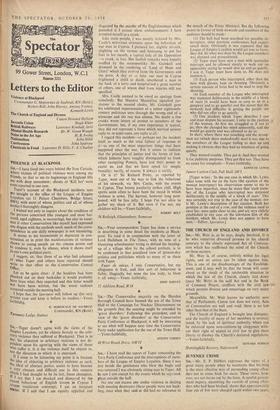THE CHURCH OF ENGLAND AND DIVORCE
SIR,—Mr. Weir is, as he says, deeply involved. It is he who remarries divorced persons in his church contrary to the clearly expressed Act of Convoca- tion which has reaffirmed the mind of the Church on these matters.
Mr. Weir is, of course, entirely within his legal rights, and no action can be taken against hiM. This is one of the disadvantages of the Establish- ment, and it may well be that the break will come about as the result of the intolerable situation in which the law of the Church, clearly laid down (pace Mr. Weir) in the said Act and in the Book of Common Prayer, conflicts with the civil law which permits divorce and remarriage on very many grounds.
Meanwhile, Mr. Weir knows no authority save that of Parliament. Canon law does not exist; Acts of Convocation are null and void; there is no law other than that of the State.
The Church of England is brought into disrepUte, and the loyalty of many of her members is severely taxed, by the lack of spiritual authority which can be enforced upon non-conform. ng clergymen with- out their right of appeal to civil law to give them liberty to disobey the Church's declared regulations. —Yours faithfully,'


































 Previous page
Previous page